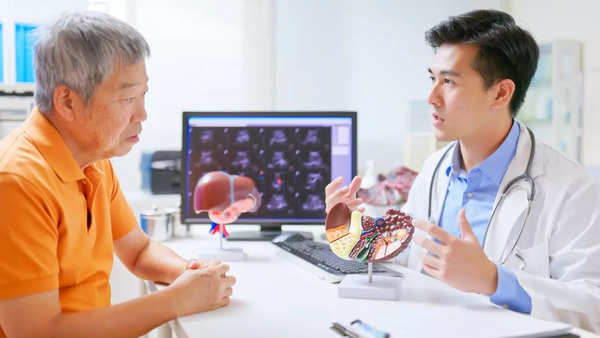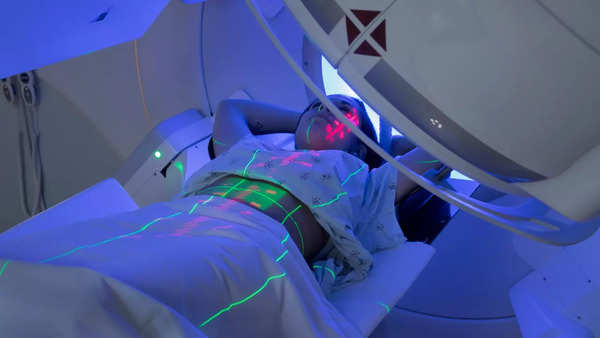You are what you eat is true after all. Because your diet has a lot to do with your overall well-being. A new study by scientists at the University of California San Diego School of Medicine has found how certain diets can increase your risk of liver cancer.
Liver cancer
is the sixth most frequently diagnosed cancer and the fourth leading cause of cancer deaths worldwide.
The study, published in Nature, finds how changes in cell function and DNA damage can lead
fatty liver disease
to progress into liver cancer. The findings suggest new possibilities for preventing and treating liver cancer and also delve into the origin of cancer and the effects of diet on our DNA.
Hepatocellular carcinoma (HCC), the most common type of liver cancer has increased by 25-30% in the past 20 years, largely due to the rise in fatty liver disease, which affects 25% of U.S. adults. About 20% of people with fatty liver disease develop a severe form called metabolic dysfunction-associated steatohepatitis (MASH), which raises the risk of HCC. The transition of
MASH
to liver cancer is, however, not yet fully understood.
“Going from fatty liver disease to MASH to liver cancer is a very common scenario, and the consequences can be deadly. When you have MASH, you either end up destroying your liver and then you need a new liver, or you progress to frequently fatal liver cancer, but we still don’t understand what’s happening at the subcellular level during this process,” Michael Karin, Ph.D., Professor in the Department of Pharmacology at UC San Diego School of Medicine said in a statement.
The researchers used mouse models and human tissue samples to demonstrate that MASH-inducing diets, which are rich in fat and sugar, cause DNA damage in liver cells that causes them to go into senescence, a state in which cells are still alive and metabolically active but can no longer divide. Senescence is a normal response to cellular stressors. Ideally, it allows time for the body to repair or eliminate these cells before they can cause further harm.
However, the researchers found that this isn’t what happens in liver cells (hepatocytes). In hepatocytes, some damaged cells survive this process. According to Karin, these cells are “like ticking time bombs that could start proliferating again at any point and ultimately become cancerous.”
“Comprehensive genomic analyses of tumor DNA indicate that they originate from liver cells damaged by MASH, emphasizing a direct link between diet-induced DNA damage and the development of cancer,” co-author of the study, Ludmil Alexandrov, Ph.D., associate professor of cellular and molecular medicine and bioengineering at UC San Diego and member of UC San Diego Moores Cancer Center said. The findings suggest that developing new drugs to prevent or repair DNA damage could be a promising way to prevent liver cancer, especially in people with MASH.
“There are a few possibilities for how this could be leveraged into a future treatment, but it will take more time and research to explore these ideas. One hypothesis is that a high-fat diet could lead to an imbalance in the raw materials our cells use to build and repair DNA, and that we could use drugs or nutri-chemicals to correct these imbalances. Another idea is developing new antioxidants, much more efficient and specific than the ones we have now, and using those could help block or reverse the cellular stress that causes DNA damage in the first place,” Karin adds.
The study also looked into the link between aging and cancer. “We know that aging increases the risk of virtually all cancers and that aging is associated with cellular senescence, but this introduces a paradox since senescence is supposed to guard against cancer. This study helps reveal the underlying molecular biology that allows cells to re-enter the cell cycle after undergoing senescence, and we believe that similar mechanisms could be acting in a wide range of cancers,” Karin shares.
The researchers also found the harmful effects of poor diet on cellular metabolism, which according to Karin, could help guide public health messaging related to fatty liver disease.
Medithon Part 5 | Diabetes & Obesity
“A poor, fast-food diet can be as dangerous as cigarette smoking in the long run. People need to understand that bad diets do far more than just alter a person’s cosmetic appearance. They can fundamentally change how our cells function, right down to their DNA,” Karin said.
(Pic courtesy: iStock)
I’m Manas Ranjan Sahoo: Founder of “Webtirety Software”. I’m a Full-time Software Professional and an aspiring entrepreneur, dedicated to growing this platform as large as possible. I love to Write Blogs on Software, Mobile applications, Web Technology, eCommerce, SEO, and about My experience with Life.





